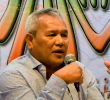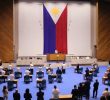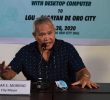DAVAO CITY – Various activist groups in Davao and other regions opposed the signing of a defense agreement and a trade partnership between the Philippine and United States governments which they said are one-sided.
These groups also marched on the streets on Monday and Tuesday in time for the state visit of US President Barack Obama who stressed US “partnership” in trade and defense.
It was at his visit that the Enhanced Defense Cooperation Agreement (EDCA) was signed and the Trans Pacific Partnership Agreement (TPPA) was announced.
Signed between Defense Secretary Voltaire Gazmin and US Ambassador Philip Goldberg, the EDCA allows further US troops deployment and docking at Philippine Armed Forces areas all over the country.
Obama repeatedly praised US troops’ participation in rescue operations after Typhoon Yolanda struck Leyte and said this is the visible sign of America’s partnership with Philippine troops.
“The United Sates will continue to stand with you as you recover and rebuild,” said Obama in a joint press conference in Malacañang on Monday.
But according to Gelyne Alapag of the activist youth group Anakbayan in Davao, the US president shouldn’t use the humanitarian efforts as a pretext for its military presence in the country.
“The help and support which America will give the country is not America’s responsibility,” said Alapag.
The signing of EDCA was hit as unconstitutional by Bayan Muna Partylist and the Mindanao-based Panalipdan (Defend) Mindanao for allowing the US military an unlimited access to various areas. The groups also said there is the possibility that these warships will bring in nuclear weapons and will dump toxic wastes in the country.
But officials said the agreement respects the nuclear ban.
While Obama said “there would be no reclaiming of old bases” referring to former bases at Olongapo and Subic, the women’s group Gabriela said US troops had found “new bases” in Mindanao.
“The US Armed force have been staying in Jolo (Sulu) and in Camp Navarro in Zamboanga, aren’t these bases of United States?” said Gabriela Davao’s spokesperson Corazon Espinoza.
Espinoza said that US troops had long been stationed in Mindanao through the Visiting Forces Agreement that led to Balikatan US-PH military exercises in Mindanao since 2002.
Asian pivot
But the military presence has been seen by Ibon Foundation as part of the US “Asian pivot” to secure its economic and political position in the Asia-Pacific.
Former US State Secretary Hilary Clinton stated in 2011 the US interest as follows:
“[In] the 21st century, the world’s strategic and economic center of gravity will be the Asia Pacific… And one of the most important tasks of American statecraft over the next decades will be to lock in a substantially increased investment – diplomatic, economic, strategic, and otherwise – in this region.”
Arian Ramos of the League of Filipino Students said US armed forces have deployed 60% of its warship and 50% of its troops in Asia, indicating US intention of securing its presence in Asia, especially with the emerging economic and military dominance of China.
Ibon said the US strategy involves focusing on China through the Strategic and Economic Dialogue and US-China Joint Commission on Commerce and Trade.
With this hindsight, Obama has carefully worded his position on China’s dominance in disputed territories including the Spratly Islands, saying the US’ goal “is not to counter China… (nor) contain China.”
“There is enormous trade; enormous business that is done between the United States and China; a whole range of issues on the international stage in which cooperation between the US and China are balanced,” Obama said.
LFS National Chair Charlotte Velasco said Obama’s statement “is certainly a slap in the face for the Aquino government who has doggedly defended the deal with US.”
“Shocks” via-TPPA
Obama’s second purpose in his state visit was to push for the TPPA, a multilateral agreement with various countries in Asia including the Philippines.
Obama said in his speech that US Commerce Secretary Penny Pritzker would arrive in the Philippines on June with a delegation of American business leaders to “explore new opportunities.”
Last April 25, the American Chamber of Commerce-Philippines led its European Union and Japanese chamber counterparts to forge a South-Mindanao Growth Corridor that intends to place the region as a gateway for investments in Asia for agri-business and manufacturing sectors.
But according to the nongovernmental Ecumenical Institute for Labor Education and Research (EILER), labor and natural resources in the Philippines would be further exploited and exposed “to external shocks.’
“With Obama’s push for TPP, we fear that thousands of workers will be laid off as small enterprises will be jostled out of the market with the entry of big foreign capitalists and greater influx of imported goods. Further trade and investment liberalization will be only for US gain,” EILER executive director Anna Leah Escresa said.
“Pressure will also be exerted in export-oriented special economic zones to maintain a vast pool of cheap and contractual labor, in line with the globalization mantra of global competitiveness and trade efficiency. Labor’s race to the bottom will be much worse,” she added.
Escresa said the Philippine economy has performed poorly in the past decades as it follows the neo-liberalization policy and sees no difference with the TPP.
“In the three decades of liberalization, the key economic sectors of manufacturing and agriculture have been in perpetual decline. Employment in manufacturing did not surpass the 4-million mark. Agriculture’s share in the country’s gross domestic product has continued to shrink,” Escresa said.
Another aspect of the TPP that has worried Gabriela Women Partylist Representative Emmi de Jesus is the power of transnational corporations to sue local governments.
“It will give monstrous powers to private corporations to sue sovereign governments and blackmail them into ensuring their profits are protected while the poor lose access to cheap technologies,” she said.
She also said that the TPP would require charter change on the economic provisions to remove barriers to foreign investments.
De Jesus said the progressive bloc Makabayan would pressure and keep watch on Congress to protect the country’s economic and patrimony rights. (with reports from Amal-Ryan Rinabor, Davao Today Intern)










